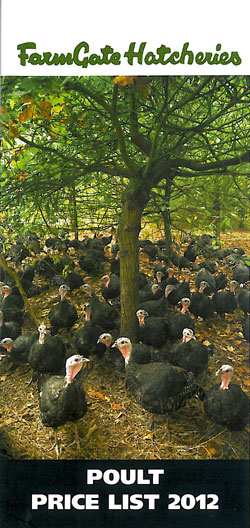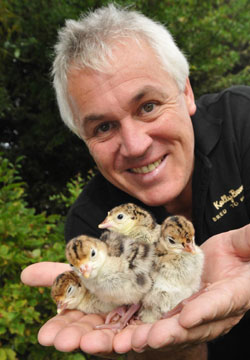



Flavour Key to Repeat Christmas Business
UK - Eating quality is top priority for the FarmGate Hatcheries — one of the largest suppliers of poults to producers of the traditional Christmas turkey — according to managing director Paul Kelly.

In his annual newsletter for customers Mr Kelly says that this policy has led them to stop breeding from two pure lines over the past three years because of relatively poor eating quality.
"It is no coincidence that our breeds have won the quality British turkey awards for eight consecutive years," he says. "We have a very unique programme to select breeding stock that eats superbly. I can confidently say I have tasted more turkeys of different breeds than anyone else on the planet! I can assure you there are big differences in various breeding lines for both bronze and white.
"Ultimately it is the experience your customers have at their Christmas dinner that is the key to repeat business."
Mr Kelly describes their bronze turkeys as ‘the genuine article’, bred from a bronze mother and a bronze father.
He advises producers to plan their poult order carefully to supply demand. "Getting the correct weights makes the whole job not just a little bit, but massively easier," he says.
FarmGate Hatcheries is offering this year a choice of six bronze and four white strains available from May to September. Prices are up by 2.5 per cent reflecting the general level of inflation.
One change is in the parentage for the smallest strain – the Tiny bronze — which will now achieve 10 per cent heavier weights.
To make ordering easier customers can now use a facility on the new website — farmgatehatcheries.co.uk -- to calculate their poult requirements based on the weight spread needed to meet their Christmas demand. It will also predict their feed requirements.
Mr Kelly points out that liveweight predictions are based on average values, with big changes in nutrition, temperature and stocking density likely to influence growth rates by 20 per cent up or down.
For example, with 100 Wrolstad hens plucked at 20 weeks they would expect 15 at 5.5 to 6 kg, 70 at 6 to 7 kg and 15 at 7 to 7.5 kg.
Given this natural spread and environmental factors carrying from year to year, they have found a combination of one third as-hatched and two thirds hens provides a great spread of weights to suit just about every order book, with no more than two placements per season necessary where facilities allow.








